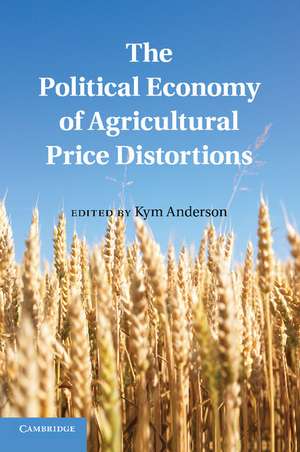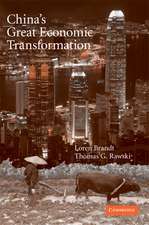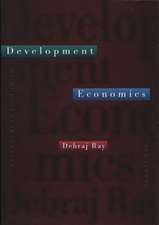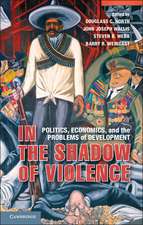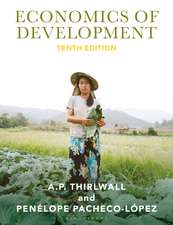The Political Economy of Agricultural Price Distortions
Editat de Kym Andersonen Limba Engleză Paperback – 21 aug 2013
| Toate formatele și edițiile | Preț | Express |
|---|---|---|
| Paperback (1) | 378.83 lei 6-8 săpt. | |
| Cambridge University Press – 21 aug 2013 | 378.83 lei 6-8 săpt. | |
| Hardback (1) | 690.19 lei 6-8 săpt. | |
| Cambridge University Press – 29 aug 2010 | 690.19 lei 6-8 săpt. |
Preț: 378.83 lei
Nou
Puncte Express: 568
Preț estimativ în valută:
72.49€ • 75.68$ • 59.99£
72.49€ • 75.68$ • 59.99£
Carte tipărită la comandă
Livrare economică 05-19 aprilie
Preluare comenzi: 021 569.72.76
Specificații
ISBN-13: 9781107616271
ISBN-10: 1107616271
Pagini: 464
Ilustrații: 36 b/w illus. 61 tables
Dimensiuni: 152 x 229 x 26 mm
Greutate: 0.68 kg
Editura: Cambridge University Press
Colecția Cambridge University Press
Locul publicării:New York, United States
ISBN-10: 1107616271
Pagini: 464
Ilustrații: 36 b/w illus. 61 tables
Dimensiuni: 152 x 229 x 26 mm
Greutate: 0.68 kg
Editura: Cambridge University Press
Colecția Cambridge University Press
Locul publicării:New York, United States
Cuprins
Part I. Introduction: 1. Understanding government interventions in agricultural markets Kym Anderson; 2. Agricultural distortion patterns since the 1950s: what needs explaining Kym Anderson, Johanna Croser, Damiano Sandri and Ernesto Valenzuela; Part II. Conceptual Frameworks and Historical Origins: 3. Political economy of agricultural distortions: the literature to date Johan Swinnen; 4. Special interests versus the public interest in policy determination Gordon Rausser and Gérard Roland; 5. Anglo-French trade, 1689–1899: agricultural trade policies, alcohol taxes and war John Nye; 6. Agricultural protection growth in Europe, 1870–1969 Johan Swinnen; 7. Determinants of farm policies in the United States, 1996–2008 David Orden, David Blandford and Tim Josling; 8. Agricultural distortions in the transition economies of Asia and Europe Scott Rozelle and Johan Swinnen; Part III. Political Econometrics: The Past Fifty Years: 9. Agricultural price distortions and stabilization Will Masters and Andres Garcia; 10. Which governments tax or subsidize agricultural trade? Kishore Gawande and Bernard Hoekman; 11. Impacts of ideology, inequality, lobbying and public finance Pushan Dutt and Devashish Mitra; 12. Agricultural trade interventions in Africa Robert Bates and Steven Block; 13. Do trade agreements reduce the volatility of agricultural assistance rates? Olivier Cadot, Marcelo Olarreaga and Jeanne Tschopp; 14. Constitutional rules and agricultural policy outcomes Alessandro Olper and Valentina Raimondi; Appendix. Coverage and distribution of assistance across countries and products, 1955–2007 Kym Anderson and Johanna Croser.
Recenzii
Review of the hardback: 'Efficiency-sapping agriculture protection in the rich nations continues to be a problem, and it seems to be spreading to emerging economies just when climate change will require the world's food production and trade to be more efficient. Using a massive new data set, this book illuminates the political economy determinants of farm policies - the determinants that we must change if the world's food production is to meet twenty-first-century challenges. In short this book is right; the right people on the right topic at the right time.' Richard Baldwin, Graduate Institute of International Studies, Geneva
Review of the hardback: 'Kym Anderson should be commended for his great public service in organizing this splendid volume. The agricultural trade policy analysts he brings together here are astute and shed great light on existing government distortions to these markets. This is a very interesting book on an important topic.' Douglas Irwin, Dartmouth College
Review of the hardback: 'This book is rich, both in the early chapters, which provide excellent summaries of the literature, and in the later ones, which push the understanding of political economy forward. It is a must-read for anyone wanting to know about government policies toward agriculture, their high cost to the global economy, and their often unintended effects on farmers. The research reported on the political economy of these policies breaks new ground and also presents a challenging menu of questions for further research.' Anne Krueger, Johns Hopkins University and Stanford Center for International Development
Review of the hardback: 'Poor countries are poor because of their politics, and the place where this has the biggest consequences is agriculture. To understand these issues, this book, which brings together the leading scholars of this topic with a huge new database, is the place to start.' James Robinson, Harvard University
Review of the hardback: 'This collaborative effort is a tour de force in enhancing the understanding of the characteristics and determinants of agricultural intervention policies, currently and historically, in both the major industrialized countries and the developing countries. It is especially timely in light of the key role that agriculture is playing in the ongoing Doha Round negotiations.' Robert M. Stern, University of Michigan
Review of the hardback: 'As an overall impression, this is a well-written and composed book on an important topic.' The Journal of World Trade Review
Review of the hardback: 'Kym Anderson should be commended for his great public service in organizing this splendid volume. The agricultural trade policy analysts he brings together here are astute and shed great light on existing government distortions to these markets. This is a very interesting book on an important topic.' Douglas Irwin, Dartmouth College
Review of the hardback: 'This book is rich, both in the early chapters, which provide excellent summaries of the literature, and in the later ones, which push the understanding of political economy forward. It is a must-read for anyone wanting to know about government policies toward agriculture, their high cost to the global economy, and their often unintended effects on farmers. The research reported on the political economy of these policies breaks new ground and also presents a challenging menu of questions for further research.' Anne Krueger, Johns Hopkins University and Stanford Center for International Development
Review of the hardback: 'Poor countries are poor because of their politics, and the place where this has the biggest consequences is agriculture. To understand these issues, this book, which brings together the leading scholars of this topic with a huge new database, is the place to start.' James Robinson, Harvard University
Review of the hardback: 'This collaborative effort is a tour de force in enhancing the understanding of the characteristics and determinants of agricultural intervention policies, currently and historically, in both the major industrialized countries and the developing countries. It is especially timely in light of the key role that agriculture is playing in the ongoing Doha Round negotiations.' Robert M. Stern, University of Michigan
Review of the hardback: 'As an overall impression, this is a well-written and composed book on an important topic.' The Journal of World Trade Review
Descriere
This book seeks to improve our understanding of why societies adopt policies that distort agricultural prices.
